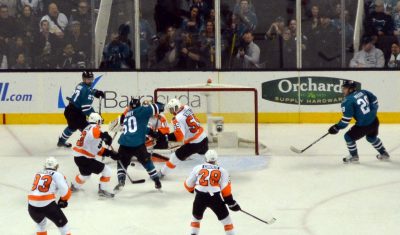
This season the NHL has been, for the most part, diligent about handing out suspensions and fines to players who violate the league’s rules, and it’s important this trend continues.
The most recent fine recipient was San Jose Sharks forward Timo Meier. He received a $2,000 fine for his second citation for Diving/Embellishment in Saturday’s game against the Nashville Predators. While this is one of the more minor fines of the season, it’s still important to note when discussing how the NHL is policing its players this season.
One of the biggest topics in fines and suspensions this year is how the league is treating hits to the head, and there definitely hasn’t been a shortage of suspensions because of it.
The first illegal check to the head suspension of the season was a hefty one — with Washington Capitals forward Tom Wilson facing a 14-game suspension, which was originally supposed to be 20, beginning in October and going into the first two weeks of November.
By the time he returned to the ice against the Minnesota Wild on Nov. 13, he had lost about $1 million of his salary.
Setting the tone for how checks to the head would be disciplined this season, the NHL has remained diligent in handing out these fines and suspensions, even when the offender’s check may not have even reached the player’s head.
Take, for example, Evgeni Malkin’s one-game high-sticking suspension for angrily swinging his stick at Philadelphia Flyers’ forward Michael Raffl. As previously mentioned on Behind the Glass, when looking at the NHL’s Department of Player Safety video of Malkin’s infraction, it’s hard to tell if his stick struck Raffl in the head, and Malkin insists it didn’t.
NHL Player Safety, stating Malkin’s actions were dangerous and were an intentional attempt to harm Raffl, rightfully gave Malkin the one-game suspension. It was the first suspension of his career.
Between Oct. 28 and Nov. 15, three players were suspended for an illegal check to the head: Ottawa Senators defenseman Mark Borowiecki for three games, Winnipeg Jets forward Brendan Lemieux for two games and Arizona Coyotes forward Josh Archibald for two games.
Since Malkin’s suspension in February, there have been some more big names in hockey receiving illegal check to the head suspensions, such as the Edmonton Oilers’ Connor McDavid and the Buffalo Sabres’ Jack Eichel. Both of these players received two games apiece for their infractions.
This continuous discipline of not only illegal checks to the head but other dangerous infractions such as high-sticking, interference and charging is a sign the NHL is taking the safety of its players seriously. As the amount of research on CTE in NHL players increases, there has been more pressure to protect the league’s players, and it seems the league is following through.
Many have argued that with the elimination of fighting from hockey, the sport has become “softer,” but there are still just as many, if not more, people watching the NHL.
According to Sports Media Watch, 2018’s Stanley Cup Final matchup between the Las Vegas Golden Knights and the Washington Capitals was the most watched Final in three years with almost five million viewers.
A team in its first year playing against a team that had not only a captain that is one of the best players in the league, but had never won a Stanley Cup? Either way, an important piece of history was made, making for some very exciting hockey.
Hockey is still just as exciting as it was in the past, and if the NHL continues to closely monitor and discipline players for their infractions, there will be many more years of exciting hockey to watch because, hey, at least your favorite player won’t be out with a concussion because he was hit in the head.











